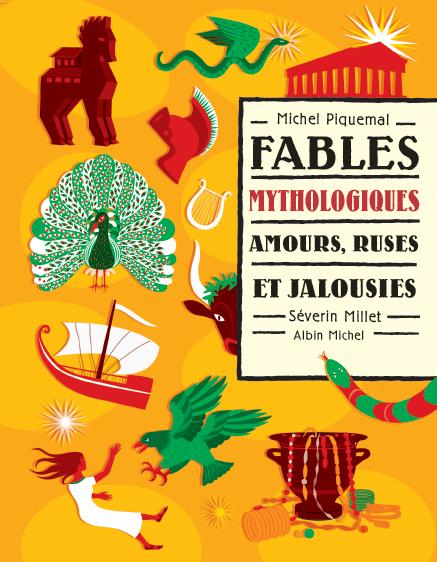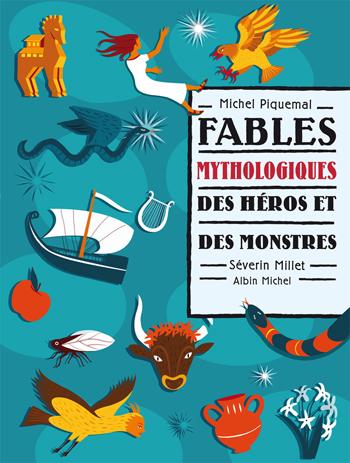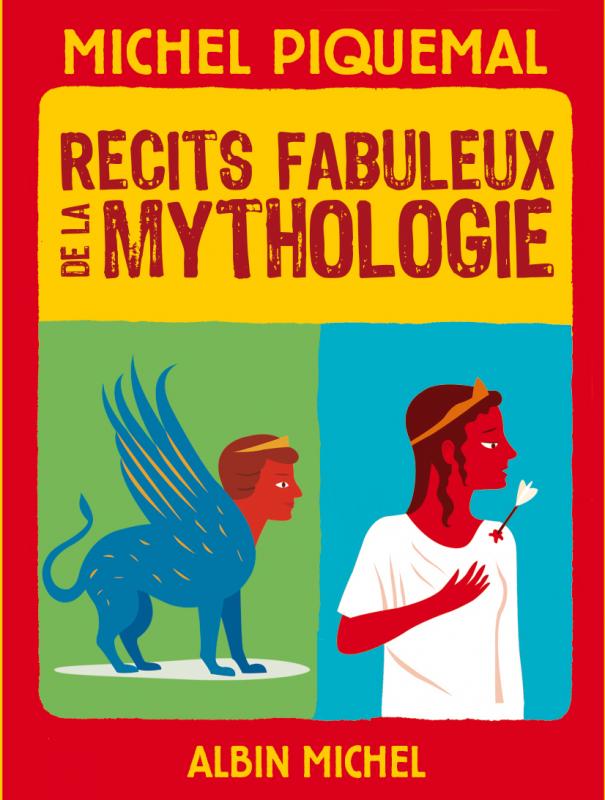Title of the work
Country of the First Edition
Country/countries of popularity
Original Language
First Edition Date
First Edition Details
Michel Piquemal, Récits fabuleux de la mythologie : amours, ruses et jalousies [Fabulous Mythological Tales: Loves, Tricks, and Jealousies]. Paris: Éditions Albin Michel, 2006. Vol.1.
Michel Piquemal, Récits fabuleux de la mythologie : les héros et les monstres [Fabulous Mythological Tales: Heroes and Monsters]. Paris: Éditions Albin Michel, 2006. Vol. 2.
ISBN
Genre
Illustrated works
Instructional and educational works
Myths
Target Audience
Children (from age 9)
Cover

Cover of Récits fabuleux de la mythologie : amours, ruses et jalousies by Michel Piquemal, ill. Séverin Millet (Éditions Albin Michel, 2006). Courtesy of Éditions Albin Michel. Retrieved from albin-michel.fr (accessed: September 13, 2022).

Cover of Récits fabuleux de la mythologie : les héros et les monstres by Michel Piquemal, ill. Séverin Millet (Éditions Albin Michel, 2006). Courtesy of Éditions Albin Michel. Retrieved from albin-michel.fr (accessed: September 13, 2022).

Cover of Récits fabuleux de la mythologie by Michel Piquemal, ill. Séverin Millet (Éditions Albin Michel, 2012). Courtesy of Éditions Albin Michel, retrieved from albin-michel.fr (accessed: September 13, 2022).
Author of the Entry:
Elżbieta Olechowska, University of Warsaw, elzbieta.olechowska@gmail.com
Peer-reviewer of the Entry:
Lisa Maurice, Bar-Ilan University, lisa.maurice@biu.ac.il

Séverin Millet
, b. 1977
(Illustrator)
Born in Valence in 1977; studied drawing at École supérieure des arts décoratifs de Strasbourg and began working for the influential French daily Le Monde where his drawings were first published. He also produces illustrations for other press outlets (Télérama et Libération) and for children’s books. He uses various techniques in his work, including silk-screen. He not only illustrates children’s books but also writes for children: he has published to date (2016) a dozen children’s books.
Sources:
S. Millet’s website (accessed: June 26, 2018).
S. Millet's blog (accessed: June 26, 2018).
Bio prepared by Elżbieta Olechowska, University of Warsaw, elzbieta.olechowska@gmail.com

Portrait (accessed: May 28, 2018): Michel Piquemal au 7e salon du livre de jeunesse à Cormontreuil, March 2012, photo by Garitan, licenced under Creative Commons Attribution-Share Alike 3.0, f
Michel Piquemal
, b. 1954
(Author)
Born on December 17, 1954 in Béziers (Hérault, France). He studied literature, comparative literature, and education; worked until 1988 as a primary school teacher. Authored over two hundred books for children and YA, writes texts for comic books, song lyrics, television scripts, articles in children’s periodicals. One of his favourite themes is philosophy, another… the American Indians. He produces an average of six books per year. He tried many different genres, including detective stories, theatre, heroic fantasy.
In 1989, he won the grand prize for a book for youth awarded by the French Ministry of Youth & Sports for his novel Le Jobard. He created a collection Carnets de sagesse published at Éditions Albin Michel to which he contributed himself several volumes.
La Chanson des Sirènes won the Prix Jeunesse Mousse du Salon du livre maritime in Concarneau in 1999 (see here, accessed: June 3, 2018).
Michel Piquemal’s Works Inspired by Antiquity – bolded titles refer to texts included in the survey.
Piquemal, Michel. Petite anthologie de la Mythologie. Toulouse: Éditions Sédrap, 1996. Collection Genres Littéraires au Collège.
Piquemal, Michel. La chanson des sirènes. Album pour les 7- 12 ans, illustré par Max Cabanes. Toulouse: Éditions Milan, 1998. Gd Prix salon livre Concarneau 1999.
Piquemal, Michel. Les Philo-Fables. 60 Fables accompagnées de questions, de repères et de mots-clés; dès 9 ans. Paris : Éditions Albin Michel, 2003.
Translation : Chinese, Spanish, Korean, Greek, Hebrew, Brasilian Portuguese, Italian, Serbian,Polish
Sound version: Montreal: Éditions Stanké, s.d.
Piquemal, Michel. Petites & grandes fables de Sophios. Paris: Éditions Albin Michel, 2004.
Translation: Chinese, German, Japanese, Italian Sound version: Montreal: Éditions Stanké, s.d.
Piquemal, Michel. Récits fabuleux de la mythologie: amours, ruses et jalousies, Paris: Éditions Albin Michel, 2006. Vol.1 .
Translations: Chinese, Italian
Sound version: Montreal: Éditions Stanké, s.d.
Piquemal, Michel. Récits fabuleux de la mythologie: les héros et les monstres [Fabulous Mythological Tales : Heroes and Monsters]. Paris: Éditions Albin Michel, octobre 2006. Vol. 2.
Translation : Chinese
Sound version: Paris: Éditions Albin Michel, s.d.
Piquemal, Michel. Les Philo-Fables, Paris: Livre de Poche, mai 2010.
Vol. 1-2 for adult reader.
Piquemal, Michel et Daniel Royo. Le secret de Marcus Caïus Victor, roman historique pour les 8/12 ans au coeur de la Gaule narbonnaise. Illustrations de Gwendal Lazzara. Toulouse: Éditions Sédrap, novembre 2011
Piquemal, Michel. Récits fabuleux de la mythologie. Illustrations by Séverin Millet. Paris: Éditions Albin Michel, 07.12.2012.
Sources:
Michel Piquemal’s official website (accessed: June 3, 2018).
Full bibliography of books by Michel Piquemal is posted here (accessed: June 3, 2018).
Bio prepared by Elżbieta Olechowska, University of Warsaw, elzbieta.olechowska@gmail.com
Translation
Chinese, Italian.
Polish: Bajki filozoficzne: Świat mitologii, trans. Maria Braunstein, Michał Krasicki, ill. Agnieszka Malmo, Warszawa: Muchomor, 2016.
Sound version: Montreal: Éditions Stanké, s.d.
Summary
The book begins with two short introductions (each signed separately by the author, clearly a reprint of the introductions published in the two-volume first edition) explaining why the author decided not to rely on various mythologies but rather go back directly to sources, i.e. to ancient authors who transmitted mythological stories. As a result, Michel Piquemal produced a collection of myths divided in two parts (volumes in the 2006 editions): Des héros et des monstres [Heroes and Monsters] and Amours, ruses et jalousies [Love, Tricks, and Jealousies]. There are fourteen myths in each of the two parts.
Part one: 1. Zeus and the Creation of the Universe 2. Prometheus, the Friend of Humans 3. Phaeton and the Chariot of the Sun 4.Heracles and the Lernean Hydra 5. Hercules and the Tunic of Nessos 6. Perseus, the Son of the Golden Rain 7. Sisyphus, or Eternal Punishment 8. Tantalus and the Torment of Desire 9. Arachne, the Spinner for Eternity 10. Midas and the Donkey Ears 11. Theseus and Ariadne’s Thread 12. Icarus, the Bird-Man 13. Pegasus and Bellerophon 14. Oedipus, a Prisoner of Destiny.
Part two: 1. Paris and the Apple of Discord 2. Penelope, the Faithful 3. Demeter and the Race of Seasons 4. Daphne, the Terrified Beauty 5. Narcissus, or Love of Self 6. Io, the Eternal Fugitive 7. Leda and the Swan Who Came from Heaven 8. Europa, the Object of Desire 9. Amphitryon and the Ruse of Zeus 10. Pygmalion and His Clay Statue 11. Atalanta, the Rebel 12. Psyche, the Inquisitive Beauty 13. Pyramus and Thisbe, the Tragic Encounter 14. Orpheus, the Love Willing to Brave Death.
Each unit is presented in the same format: a retelling of the myth is followed by a mention of ancient sources where the story was preserved, a one-page illustration, and a discussion of philosophical, linguistic or literary issues related to the myth.
Analysis
This collection of short mythical tales is accompanied by explanations of how these ancient Greek stories relate to the modern world. Piquemal says in his introduction that as much as he always loved the great Greek myths, there was there for him something not quite right: the stories were too complex, sometimes contradictory, lacking coherence. To remedy these discontents, he decided to go back to sources and become himself a storyteller of these universal and eternal myths.
Such themes, as origins of the world, heroes and their achievements, relations between various Greek gods and mortals, respect of divine and human laws, all reflect challenges humanity must face. They have an intense philosophical and psychological aspect that people of any period relate to strongly. Each of the twenty-eight myths presented in the book ends with a short analysis that brings us back to our times, written from various perspectives, as each myth requires. These well-rounded stories help children better understand classical antiquity delighting them with fantastic narrative combined with a background of contemporary analysis. The book also explains where mythology came from by quoting ancient sources and stressing their diversity.
Further Reading
Mekouar, Myriam, «Quand la littérature ne prend pas l’enfant pour une bille ! – interview avec Michel Piquemal», "La Pause Philo," 9 July 2020 (accessed October 26, 2020).
Nières-Chevrel, Isabelle, Introduction à la littérature de jeunesse, Paris: Didier Jeunesse, 2009.
Prince, Nathalie and Sylvie Servoise, Les personnages mythique dans la littérature de jeunesse, Rennes: Presses Universitaires de Rennes, 2015.
Addenda
The Author’s Official Site: http://www.michelpiquemal.com/ (accessed: April 17, 2023).


